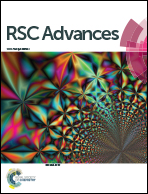Reactive oxygen species (ROS) formation ability and stability of small copper (Cu) nanoparticles (NPs)†
Abstract
A protocol to functionalize small copper nanoparticles (Cu NPs, 1–5 nm) with hydrophilic ligands is presented. The method was applied to prepare Cu NPs stabilized by cysteine, glutathione, proline, or OH−. These four types of Cu NPs were tested with respect to their stability and ability to form reactive oxygen species (ROS) in presence of H2O2. The ligands were found to affect both, ROS formation and particle stability. However, compared to Cu cations, the Cu NPs were much less effective in terms of forming ROS in the presence of H2O2. Application of copper ion chelators demonstrated that the formation of ROS in samples containing Cu NPs was mainly caused by Cu cations leached from the particles, but not by nanoparticle-specific effects. Our results suggest that a secure application of Cu in the form of NPs is restricted to reductive conditions, as under oxidizing conditions Cu NPs will degrade by the leaching of Cu ions.


 Please wait while we load your content...
Please wait while we load your content...